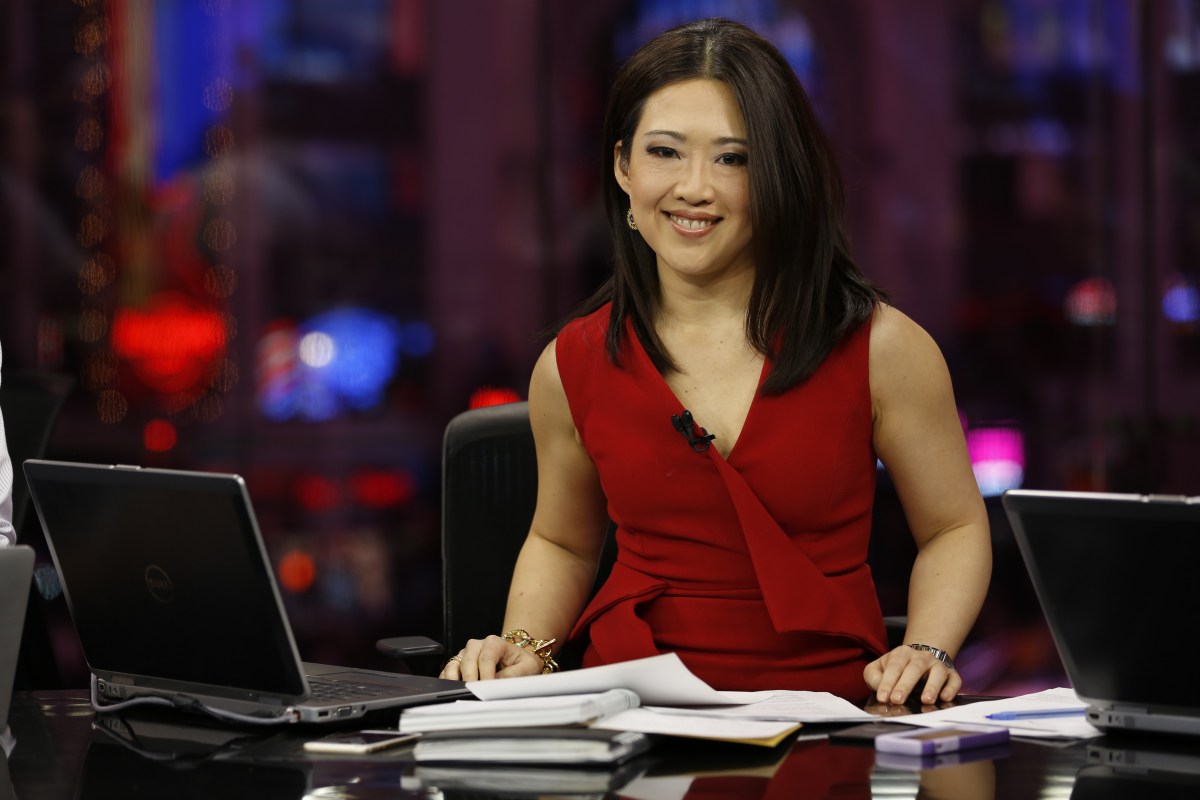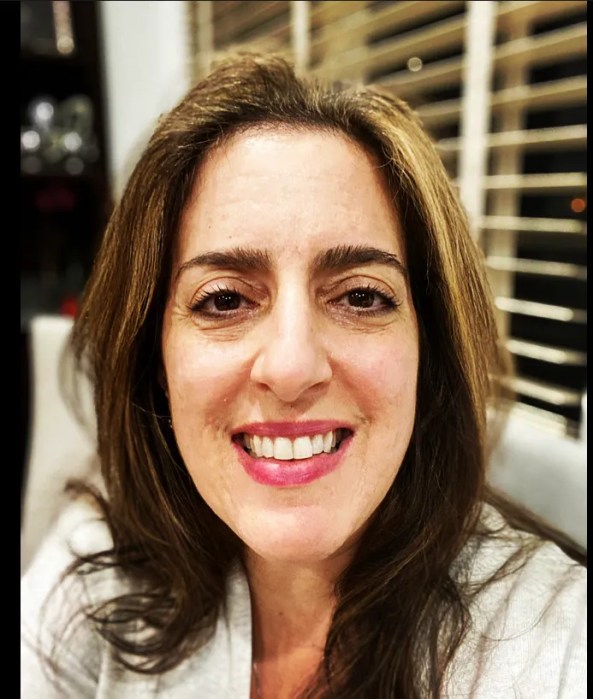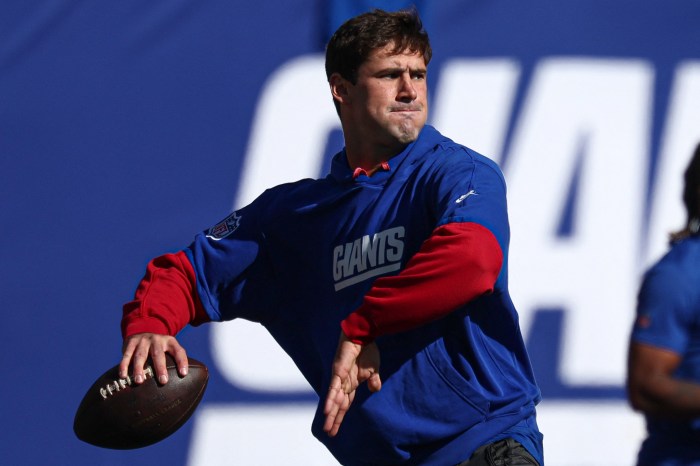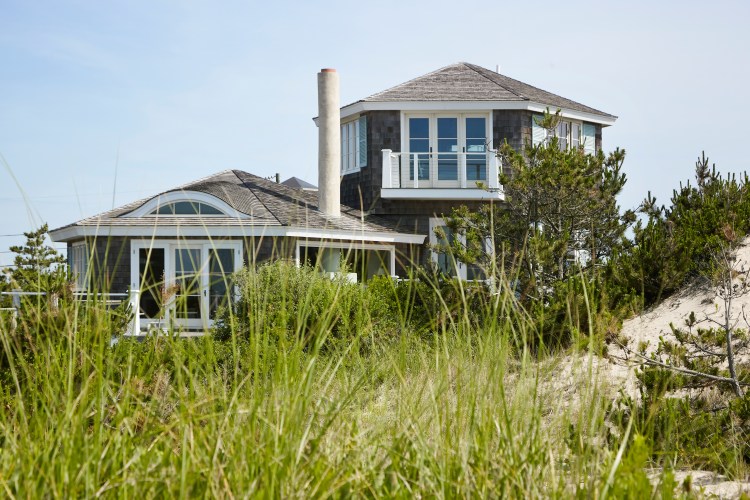Don’t be surprised if you see CNBC anchor Melissa Lee descending down to the financial news network’s studios on a parachute one of these days.
The award-winning journalist and television host flies from one show to another as host of Fast Money, an hour-long show that recaps the day on Wall Street decisions and Options Action, a half-hour show that explains the advantages of option trading, both airing daily on weekdays. She is also a cast member of Power Lunch, a two-hour show airing Monday through Friday that focuses on business, breaking news, market and stock coverage.
In between her hosting and contributing duties, Lee travels all over the world filming documentaries for the network. She’s currently abroad shooting a CNBC documentary about the growth of bitcoin in emerging global markets. Some people may need to catch their breath managing the day-to-day, but not Lee.
Lee, who just got back to New York from her honeymoon after getting married in August, spoke with the Press about growing up on Long Island, her days at Harvard University, her recent safari adventure and her second love: the stock market.
Long Island Press: Any surprises on your honeymoon safari?
Melissa Lee: Everybody watches National Geographic, right? Lions eating other animals, but when you see it in person, it is a completely different experience. I was completely unplugged, which was unusual. The WiFi was so spotty, I couldn’t even be connected if I wanted to. Sometimes you need a little nudge in that direction. I am such a city person. I was really surprised that you can see animals living together.
LIP: Your schedule is so hectic with all the shows you host, all the documentaries you are filming. How do you manage?
ML: Whether I was doing one show at the end of the day or three shows a day, which has been my typical schedule of late, it is all a process of constantly being ready. I am constantly reading and constantly talking to people when I have time in close space shows. You are not just getting ready for that day’s news, but you have to build up that foundation of knowledge so that anything can happen at any time…I may never talk about a company on a daily basis, but in that breaking news moment, you’ve got nothing but yourself to rely on and that information and knowledge.
LIP: Is there a particular show you are partial to?
ML: I love every show that I do and have done in the past for many different reasons, but I think Fast Money is the show that will always be part of my fiber. I have been on that show the longest. It is almost like it has become a part of me and I have become a part of it. And, it is a trading show. I like talking about movements of stocks, why stocks trade the way they do, the psychology of the markets. To me, it is just a fascinating puzzle. I love trying to figure that out because there is not any one answer as to why a stock moves up and down. It is also the challenge of trying to decipher all those given factors on how a stock will trade the next day on the news.
LIP: There has been so much up and down with the market. Can you tell us why it has been so volatile?
ML: The markets have lacked volatility for such a long time that this is a bit of a shock to investors. But, it’s normal action and investors are working through how rising rates will impact their investments. We’ve lived with low-interest rates for so long, and higher rates change the investment environment. How? That’s the big question, and that’s why markets have been more volatile.
LIP: I know Power Lunch is airing soon. Do you have time to eat lunch with your schedule?
ML: Well, to me, I didn’t have lunch I would be a hangry person, for sure. I always make sure I eat something, especially if I don’t eat before Power Lunch; the next opportunity is at 3 p.m. which is just way too long. I lead a very regimented life, as you can imagine with my schedule. I have a window of time to eat. I have a window of time to do makeup. I have a window of time to go to the bathroom. At 3:30 p.m. I have to be in a car to get to the NASDAQ on time for Fast Money. It is important for me to stick to the schedule because your performance on air is going to be impacted. If you are hungry, you may not be completely engaged in what is going on.
LIP: How was it growing up in Great Neck?
ML: I grew up on Arbor Street. I don’t have family that is still there. I have an older sister and a younger brother. My parents moved to the city in 2004. They waited until all of us graduated high school and started college. I went to Saddle Rock for elementary school and Great Neck South for middle school and high school. I feel like nothing exists from my era. It seems the stores are more upscale. We used to go to Gino’s Pizza and the deli on Lakeville Road. I don’t think it is still there. Sometimes my mom and I drive through to see how the town has changed or just see the outside of the house for fun.
LIP: Can you share a childhood memory?
ML: One of my first professional journalism jobs is when I worked for the Great Neck Record. That was my afterschool job during high school. I wrote articles, and it was a very valuable lesson, regarding the importance of community. Initially, I covered the PTA and then sports. I love writing and to go out to talk to people in the community. It was fun. It was a great experience. And it was a great way to earn money. I think it was 20 bucks an article. It was a lot of money even looking back. My father would have to drive me to the PTA meetings, and sometimes they were four to five hours. He would joke that he would get a cut from my paycheck.
LIP: You were assistant managing editor of Harvard’s Crimson. Were you the first in the family to go to an Ivy League school?
ML: My father went to Columbia. My father said to me, “If you don’t get into Harvard, Yale or Columbia, then you have to go to a SUNY school.” For him, education was very important, but it was also important for us to look at the big picture and see how much schools would cost and how much debt we would have when we graduated and if that would be worthwhile. I loved Harvard. It was my parents’ dream for me to go there. It was my dream. I had a picture of Harvard Yard with the commencement flags over my mirror all throughout high school because I knew that was the school I wanted to go to, so getting in was the fulfillment of my dream and my parents’ dream…To go to a place like Harvard and know that you can cut it there was very empowering for later on. I think that is one of the reasons why I was willing to take the risk of going into TV news. It seemed like the career that had the most unsure path to success. I was willing to take it because of this notion that if I made it there then I can do this and I can do that; I can do whatever I set my mind too.
LIP: Are your siblings in the same industry as you?
ML: No, I’m the outlaw. We are just doing different things. My sister is a lawyer with the Department of Justice. She is six years older than I and she is just sort of a trailblazer regarding her career path. My parents wanted a lawyer and a doctor in the family. She is a lawyer, and I was supposed to be the doctor. I thought I was going to be the doctor. In high school, in addition to liking journalism, I did all sorts of lab research over the summers. I had this real interest, and I was good at science and math too. I decided I would give journalism a whirl. My younger brother lives in Queens. He’s a small business owner, and my sister lives in Tribeca. She lives in the same building as my parents.
LIP: Being a young person today is not easy; can you share some wisdom?
ML: I think it is important for you to be your own judge. Take criticism. Factor it all in, but, at the end of the day you live with yourself. You live with your own decisions. You are your own ultimate judge. Just keep that in mind with anything you do. Especially in this day where there is Instagram and Snapchat and a lot of fear of missing out and comparing your life to others. That is not how you should live your life at all. At the end of the day, it is all about if you think you did a good job and if you think you are a good person and that you are living up to your true potential.
LIP: You have accomplished so much professionally and now being newly married. What is next for you?
ML: That is probably the hardest question anyone can ever ask me. That’s another chapter of my life. It is exciting to me to start this new life with somebody else. Professionally, when I am asked that question, I think the person expects me to say some new big job or dream job, but I enjoy what I do right now, fortunately, at CNBC. I have always been given new challenges whether it be a documentary or different show. Right now, I am shooting a documentary on bitcoin and blockchain, and that is exciting. I have always had new things to do and new ways to stretch myself, so I am not looking to go anywhere else or go into a different role.
LIP: Do your friends ask you for stock tips?
ML: Yes! And I say to them, “Do you want to take stock tips from someone who is not allowed stock themselves?”
































